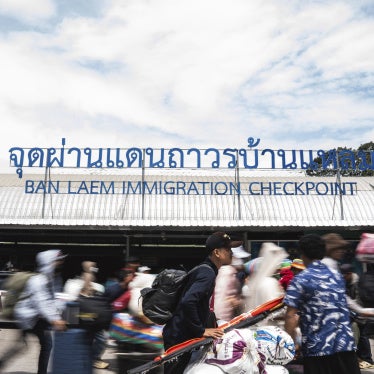A recent breakthrough in talks between the governments of Nepal and Bhutan promises new hope for tens of thousands of Bhutanese refugees living in Nepal, but significant questions remain about how Nepal and Bhutan will carry out the proposed verification and repatriation of the refugees.
Nepal is the site of one of the world's most overlooked refugee dilemmas. Forced to flee Bhutan for Nepal and India in the early 90s, more than 90,000 people are now entering their tenth year of life in the refugee camps in Nepal. A whole generation of children has been born there. Many of the refugees, mostly ethnic Nepali Hindus who farmed the southern hills and plains of Bhutan, were arbitrarily stripped of their nationality prior to their expulsion from Bhutan in the early 1990s after changes to Bhutan's nationality laws that deliberately discriminated against the southern Bhutanese.
The refugees have been caught for nearly a decade in the middle of stalled negotiations to resolve their situation. No progress was made until the tenth round of bilateral talks between the governments of Bhutan and Nepal in December 2000 when international pressure by the U.S. government, the E.U. and various European governments, the U.N. Commission on Human Rights and the U.N. High Commissioner for Refugees helped break the impasse between the two governments.
During the December 2000 talks, Nepal and Bhutan agreed to commence a joint verification of the refugees in the camps in order to determine their nationality status, with a view to ultimate repatriation to Bhutan. The breakthrough in the talks, and the recent visit by the verification team appointed from both countries to the camps, has brought a renewed sense of hope to the refugees - whose only wish over the past ten years has been to return to their homeland, Bhutan.
While these new developments are promising, many concerns remain about the process of verification and repatriation. In light of reported pressure on refugee groups to refrain from activism, it is particularly important for international organizations, like UNHCR and international NGOs, to monitor the verification process and ensure that it is carried out in accordance with international standards and that the human rights of this group of tens of thousands of refugees are upheld.
The extremely complex questions of nationality and statelessness arising from this refugee situation, have led to fears that many refugees who were arbitrarily stripped of their nationality prior to their expulsion may be denied their legitimate right to return to Bhutan. Thus, UNHCR should be included in the process as an independent third party. There is also a pressing need for a more active UNHCR presence in the refugee camps in Nepal, both to disseminate information about the verification process in order to counter the many rumors and fears that are circulating in the camps, and to closely monitor the verification process itself.
On February 15 the following organizations wrote to the governments of Bhutan and Nepal expressing our concerns about the Bhutanese refugees. A copy of the letter is attached.
Human Rights Watch
Lutheran World Federation
Women's Commission for Refugee Women and Children
Refugees International
Bhutanese Refugee Support Group








